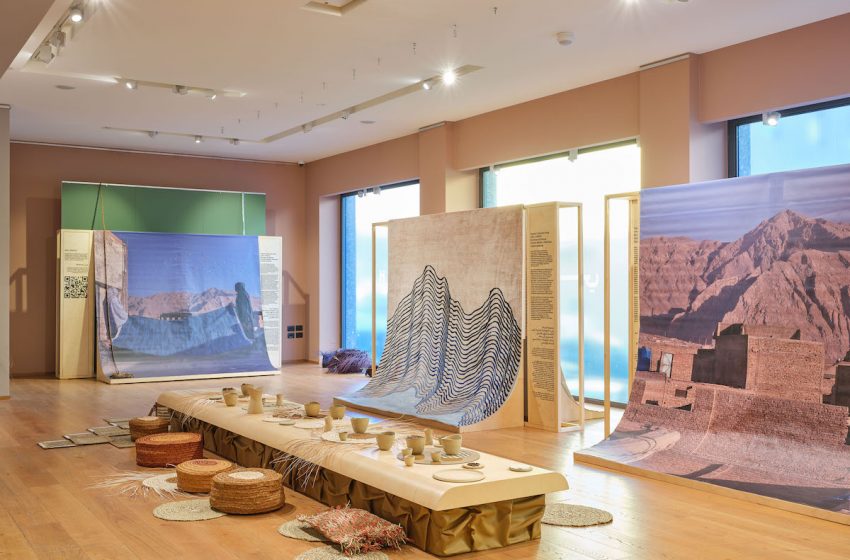Irthi launches ‘Sijada’ collection at Milan Design Week

Irthi Contemporary Crafts Council (Irthi) has joined an elite gathering of creative and innovative brands from across the globe at Milan Design Week, held from 7th to 12th June, becoming the only entity representing the Arab world at the world’s leading event for contemporary design this year.
At the most visited lifestyle event in the world featuring a rich programme of events, installations, and launches, Irthi, an affiliate of NAMA Women Advancement (NAMA), has harnessed the artistic traditions and skills of 100 refugee artisans in its latest endeavour that promotes cross-cultural design, and helps vulnerable populations build sustainable livelihoods and contribute to their host communities through their skilled craftsmanship.
The Sijada Collection Drop, unveiled at Milan’s renowned Cambi Auction House, in the presence of Sheikh Fahim Al Qasimi, Chairman of the Department of Government Relations (DGR), and Reem BinKaram, Director of NAMA, represents the success of UNHCR and Irthi’s efforts to support the socio-economic empowerment of women from conflict zones and vulnerable backgrounds through craftsmanship.
Under the Irthi – UNHCR partnership agreement, 70 Afghani refugees and 30 Pakistani displaced women artisans in refugee host communities in Quetta, Pakistan, have fused an inspiring selection of Emirati motifs created exclusively by Irthi designers with the carpet-weaving techniques of Pakistan to create a contemporary visual language.
The collection, which draws inspiration from the UAE’s mountainous topography, architectural doors and the traditional Emirati craft of Safafah, is woven with Pakistani craft techniques. It also reinforces Irthi’s mandate to ensure the continuity of craft heritage processes in the UAE, Middle East, North Africa, and South and Southeast Asia regions by elevating craft techniques and making them relevant in contemporary homeware and textile markets.
Speaking on the occasion, BinKaram stated, “Under the guidance of H.H. Dr. Sheikh Sultan bin Muhammad Al Qasimi, Supreme Council Member and Ruler of Sharjah, and H.H. Sheikha Jawaher bint Mohammed Al Qasimi, wife of the Ruler of Sharjah, Irthi’s Sijada Collection utilises the universal language of craft to address issues of displacement, strengthen resilience, and improve livelihoods amongst marginalised communities. The collection, launched in collaboration with UNHCR, uses craft as a powerful tool for impactful change and builds on Her Highness’s efforts as an eminent advocate of UNHCR to take forward the shared goals of humanitarian assistance and improve the lives of displaced peoples in conflict zones.”
Noriko Yoshida, UNHCR Pakistan Representative, commented, “The NAMA project in Quetta has a multi-faceted component as it not only enhances the livelihood opportunities but also contributes to the protection of women and girls and strengthening of social cohesion between refugee and host communities. Through this project, the skills of the carpet weavers have been enhanced to meet international standards while showcasing the unique designs from the refugee communities in Pakistan. This engagement has brought increased interest both from international and local markets with higher quality and diversified designs of the refugee made products, providing them sustained income and marketable skills.”
Designed by Eman Al Rahma, a UAE-based creative with ICCC, the Sijada collection features Abu Al-Leed Blue, a blue and black hand-dyed New Zealand Wool carpet weaved on handlooms using Pakistani techniques inspired by Emirati Safeefah motifs. ‘Al-Leed’, an Emirati term meaning a side or an edge, refers to the weaving of palm fronds into a Safeefah weave with gradient hues of colour on the sides of the weave pattern. The Abu Al-Leed collection also comes in beige and orange.
Waih Al-Bait, a hand-dyed Iranian silk carpet in blue and grey, is inspired by the façades of Emirati houses, traditionally designed with geometric motifs. Waih Al-Bait is woven on handlooms using Pakistani techniques.
The collection’s Faya range of hand-dyed Iranian silk carpets is inspired by Jebel Faya, a limestone mountain range in the emirate of Sharjah’s Central Region. The two distinct silk carpets in this collection, Faya Green and Faya Blue, feature the topographic lines of the mountain range and are handwoven using Pakistani techniques.
WAM

